Recently, Xinjiang's first integrated protection and restoration project of mountains, rivers, forests, farmlands, lakes, grassland and dessert - the integrated protection and restoration project in the important source area of the Tarim River in Xinjiang (Aksu River Basin) has been intensively started in the Aksu area, and it is planned to take three years with the total investment of 5 billion RMB. The aim is to comprehensively transform and upgrade the ecological environment of the Aksu River Basin. As the main builder of the project, busy CECEP staff can be seen everywhere on the construction site.
This project is another concrete action taken by CECEP to conscientiously implement Xi Jinping's thought on ecological civilization, fully implement the concept of "lucid waters and lush mountains are invaluable assets", actively participate in the construction of ecological civilization, and jointly build a beautiful home. For a long time, CECEP has deeply grasped the scientific connotation of "mountains, rivers, forests, farmland, lakes and grassland are a community of life", making full use of the "holistic view of traditional Chinese medicine", accurately "taking the pulse" of the regional ecology, classifying "prescriptions", so as to implement one project after another across the country. The project constantly balances the relations between various ecological elements, achieves a win-win situation in ecological, social and economic benefits, and gradually forms a group of ecological systems with comprehensive and effective governance, which can be promoted and replicated. The comprehensive environmental management model has become a practitioner, contributor and leader of the national ecological civilization construction.
Increase greenery and protect the source to ensure ecological safety of the Tarim River
Ecological protection and restoration is an important guarantee for maintaining the boundary of natural ecological safety and promoting the overall improvement of the quality of natural ecosystem.
The integrated protection and restoration project of mountains, rivers, forests, farmland, lakes, grassland and dessert in the important source area of the Tarim River in Xinjiang (Aksu River Basin) is the first project of this kind in Xinjiang and also the most extensive and most comprehensive ecological civilization construction project with the largest amount of finamcial support from the central government.
The Tarim River is the longest inland river in China and is known as the "mother river" in Xinjiang. The Aksu River is the largest tributary in the upper reaches of the Tarim River, accounting for more than 70% of the water supply, and its ecological conservation has an important impact on the downstream water supply. However, due to its location on the northwestern edge of the Taklimakan Desert, the natural geographical characteristics of the desert area determine that the ecosystem in the Aksu area is extremely vulnerable and sensitive.
In order to thoroughly improve the ecological environment of the Aksu River Basin and promote the green development of the local region, China Geo-engineering Corporation, a subsidiary of CECEP, gave full play to its professional, talent and technical advantages in the field of ecological management, established a professional team, and stationed in the Aksu region for a long time. In-depth participation in implementation, performance evaluation, etc. aimed at assisting local governments to establish a basic database of elements such as mountains, rivers, forests, farmland, lakes, grassland and dessert in the implementation area, and providing them with package services such as project feasibility studies, preliminary demonstration of implementation plans, and assistance in applying for inclusion in the national project reserve.
In May last year, the project won the competitive review organized by the state, becoming the first batch of protection and restoration projects of mountains, rivers, forests, farmland, lakes, grassland and dessert in the country, and received financial support from the central government. According to the plan, the project is deployed in the whole basin of the Aksu River, and five major types of projects including windbreak and sand fixation, oasis ecological security, water ecological protection and restoration, forest and grassland ecological conservation function improvement, and life community governance capacity building are deployed, including 35 sub-projects with the total investment of 5.373 billion RMB covering a total population of 1.7361 million in the implementation area.
As a participant and builder, China Geo-engineering Corporation has been vigorously promoting various key tasks. At present, 15 sub-projects have entered the full-scale construction stage, and the survey and design of 18 sub-projects is also ongoing. After the completion of the project, it will greatly promote the improvement of the ecological environment of the Aksu River Basin, form a beautiful ecological landscape with clear water, smooth rivers and green banks, promote the comprehensive development of the local ecological industry, and provide important resources for regional ecological safety and high-quality economic development.
Innovative practice to polish "green business card"
The cooperation with the Aksu region is only a microcosm of the CECEP system serving the whole country.
Mountains, rivers, forests, farmland, lakes, grassland and dessert compose an inseparable ecosystem. General Secretary Xi Jinping pointed out that it is necessary to improve the quality and stability of the ecosystem, adhere to the system concept, proceed from the integrity of the ecosystem, promote the integrated protection and restoration of mountains, rivers, forests, farmland, lakes, grassland and dessert, and pay more attention to the comprehensive and systematic management from the origin.
Guided by this, CECEP has gradually extended and applied the exploration and innovation accumulated over the years in the comprehensive management of the ecological environment to the pollution control of the Yangtze River Economic Belt, the ecological protection and high-quality development of the Yellow River Basin, the ecological governance of the Chishui River Basin, and the integrated development of the Yangtze River Delta. In a series of major national strategies, CECEP gradually and vigorously promoted the overall protection and systematic restoration of the regional ecological environment, which has achieved great results.
In Xianning, Hubei, the ecological environment is extremely fragile and even endangers the ecosystem of the Yangtze River due to the destruction of vegetation, serious river and lake water pollution, and perennial sand and dust in the mines. CECEP efficiently integrated the group's internal resources and technologies, implemented the Jiayu Riverside Ecological Improvement Demonstration Project, and created an integrated solution of "source pollution control + systematic pollution interception + comprehensive pollution control + ecological restoration" for the integrated design and systematic building of ecological and environmental pollution control in Xianning, to ensure that multiple pollution problems got repaired at one time. From pollution control case by case to comprehensive ecological improvement, nowadays Xianning is full of lush vegetation and vitality, the ecological environment has been significantly improved, and the functions of the ecosystem have gradually recovered.
In the Wuling Mountains of Guizhou, in response to the prominent problems of soil erosion, forest land quality degradation, rocky desertification, wetland function degradation, mining damage, and the increase of ecological silo effect faced by the local living environment, CECEP has implemented biodiversity conservation as the core by creating an integrated protection and restoration project of mountains, rivers, forests, farmland, lakes, grassland and dessert and carrying out a total of 24 sub-projects in six categories, including water basin ecological restoration, forest and grassland protection and restoration, abandoned mine ecological restoration, high-standard farmland construction and biodiversity conservation with an investment up to 5.382 billion RMB to comprehensively enhance the stability of the ecosystem in the Wuling Mountains, improve the living and breeding environment for a variety of organisms, and provide replicable and scalable experience for global biodiversity and ecological environment governance. In 2021, the project was jointly selected by the Ministry of Natural Resources, the Ministry of Ecology and Environment and the Ministry of Finance as one of the top ten demonstration projects for the integrated protection and restoration of mountains, rivers, forests, farmland, lakes, grassland and dessert.
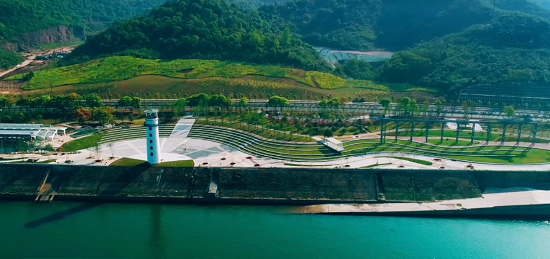
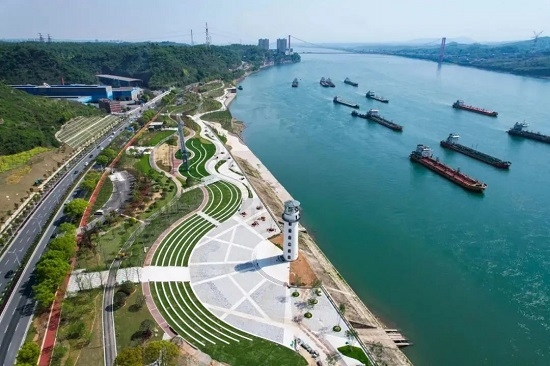
In Yichang, Hubei, CECEP focused on the improvement of the Yangtze River coastline and ecological restoration, and implemented a 9-kilometer Yangtze River coastline restoration project in accordance with the overall design of "demolishing illegal buildings to restore natural landscape with one belt, three veins and ten nodes". By carrying out comprehensive treatment projects such as sewage outlet renovation, dock environmental management, river bank re-greening, shoreline ecological restoration, river channel comprehensive renovation, water quality improvement and other projects, it has created a shoreline restoration demonstration site along the Yangtze River. After the completion of the project, the regional ecological environment has been greatly improved, and the value of the surrounding land has been effectively enhanced.
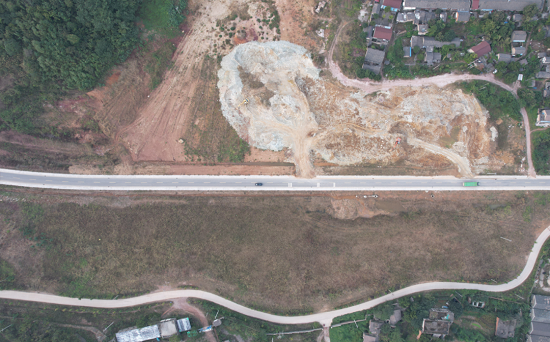
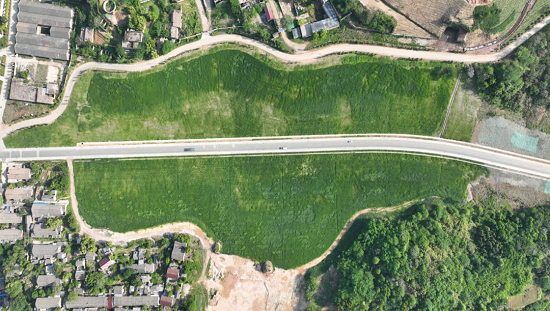
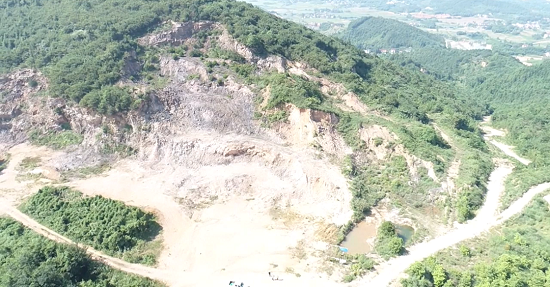
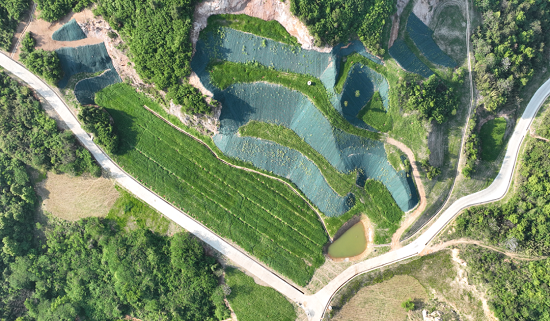
In Hefei, Anhui, the geological environment of the Lunan mine in Chaohu District is seriously damaged, the heavy metals in groundwater exceed the standard, and the soil is seriously acidified, which poses a huge threat to the ecological environment of Chaohu District. For this reason, during the implementation of the integrated protection and restoration project of mountains, rivers, forests, farmland, lakes, grassland and dessert in the Chaohu Lake Basin, CECEP carried out renovation for the ecology of the Lunan mine, in accordance with the comprehensive management concept of “reduction at the source, mitigation in the process and treatment at the end”. By adopting a variety of innovative technical means such as microbial mineralization and anti-seepage, soil in-situ matrix improvement, in-situ remediation of acidic wastewater, ecological infiltration beds, and artificial wetlands, the problem of acid soil and acid groundwater treatment in the region has been comprehensively solved, and the the hidden dangers of geological disasters in local mining areas have been eliminated. The soil quality has been improved, ecological functions have been gradually restored, and the pollution of wastewater to downstream rivers and the surrounding environment has been reduced, thus providing experience and models for the restoration of soil and water systems in the Yangtze River Basin.
With mountain repair, pollution control, forest protection, land preparation, wetland expansion, forestation and sand fixation, the successful implementation of the integrated protection and restoration projects of mountains, rivers, forests, farmland, lakes, grassland and dessert has transformed the former coal mining subsidence area into an ecological park, damaged mountains into a widespread oasis, and the polluted water system into fresh rivers and lakes. CECEP has submitted a remarkable "green answer sheet" in increasing, protecting, enriching and invigorating greenery with countless practice, exploration and innovation.
To create best solutions from place to place
At present, with the deepening of the construction of ecological civilization, more and more local governments and enterprises realize that it is difficult to truly solve ecological and environmental problems simply by relying on the power of one region, one enterprise or one technology. It has increasingly become a consensus to promote ecological protection and restoration with "systematic thinking".
"To deal with a certain type of pollution alone is like solving one problem only to find another cropping up. It must be dealt with as a whole to completely change the regional ecological environment." Whether it is in external communication or at the internal working meeting of the group company, Song Xin, Secretary of the CECEP Party Committee and Chairman of the group, always mentioned and emphasized that ecological environment governance should focus on "systematic thinking".
In Song Xin's view, coordinating and promoting the integrated governance of various ecological elements is an inevitable way to effectively solve ecological and environmental problems. Therefore, it is imperative to move from decentralized pollution control to systematic governance of the ecological environment. In this context, energy conservation and environmental protection enterprises can no longer take the distributed and fragmented governance model in the past to serve social development. Faced with the increasing needs of local ecological environment governance, only by providing a “package” of comprehensive solutions for local governments can we effectively solve the problems of regional environmental governance and win opportunities for the long-term development of enterprises.
Based on this, in recent years, CECEP has spared no effort to carry out cooperative practices in many places across the country, maximize the systemic advantages of the group's complete industrial chain and professional fields, and create a demonstration model of ecological environment governance in a comprehensive way, and continuously build capacity in providing comprehensive solutions for environmental governance to forge the unique competitiveness of CECEP.
Xianning Jiayu takes the mode of systematic control of pollution in the Yangtze River Economic Belt. Guizhou Wuling Mountain takes the mode of biodiversity + environmental protection. Xinjiang Tarim River takes the mode of full coverage of all fields for the whole process. Guizhou Bijie takes the mode of organic waste disposal + clean energy + organic agriculture to develop circular economy. Hunan Chenzhou takes the mode of tailings management + ecological restoration + cultural and tourism benchmark construction + integrated development of production and urban landscape to realise the value of ecological products. Hefei Lunan takes the mode of overall protection + systematic restoration + regional planning + comprehensive governance. A batch of replicable and scalable comprehensive ecological governance solutions have been fully implemented and taken root in many places across the country. CECEP has made bold practices and innovations in ecological environment governance. The exploration has also been highly affirmed by relevant departments, local governments and industry experts.
Since the beginning of this year, Techand, China Geo-engineering Corporation, CECDADI and many other companies have successively won bids for the integrated ecological protection and restoration projects of mountains, rivers, forests, farmland, lakes, grassland and dessert in Fujian, Qinghai, Inner Mongolia, Chishui River Basin and other places, which further enhanced CECEP's market share and influence in the field of ecological restoration.
However, in practice, CECEP also realizes that the comprehensive solution is a systematic project, which requires not only multi-disciplinary horizontal coordination such as pollution control, ecological restoration and clean energy, but also vertical connection of the whole industrial chain such as planning, investment and financing, design, construction, operation, etc. Therefore, to solve environmental problems, we can not only rely on one enterprise but need to build a network.
"Currently, we are continuously summarizing and accumulating experience on the basis of the existing cooperation model, continuously increasing innovation efforts, and providing more diversified 'customized menus' for local government on ecological governance. CECEP will play its role as the platform to aggregate multiple subjects, do a good job in coordinated promotion, and contribute wisdom and strength to the integrated protection and restoration of mountains, rivers, forests, lakes, grassland and dessert." Song Xin said.
A sound ecological environment is the most universal well-being of the people. In the next step, CECEP will adhere to the guidance of Xi Jinping's thought on ecological civilization, continue to follow the concept of life community of mountains, rivers, forests, farmland, lakes, grassland and dessert, and follow the principles of "one city, one policy" and "one region, one policy", so as to implement comprehensive ecological environment solutions in more areas such as Fujian Putian, Erhai Lake basin in Yunnan Province, Qinghai, Xinjiang Tarim River, Inner Mongolia Horqin Grassland, Chishui River Basin, etc., to provide strong support for regional ecological protection and governance, to continue to strengthen the regional ecological advantages, and to strive to achieve better ecological environment, thus making greater contributions to building a clean and beautiful world.